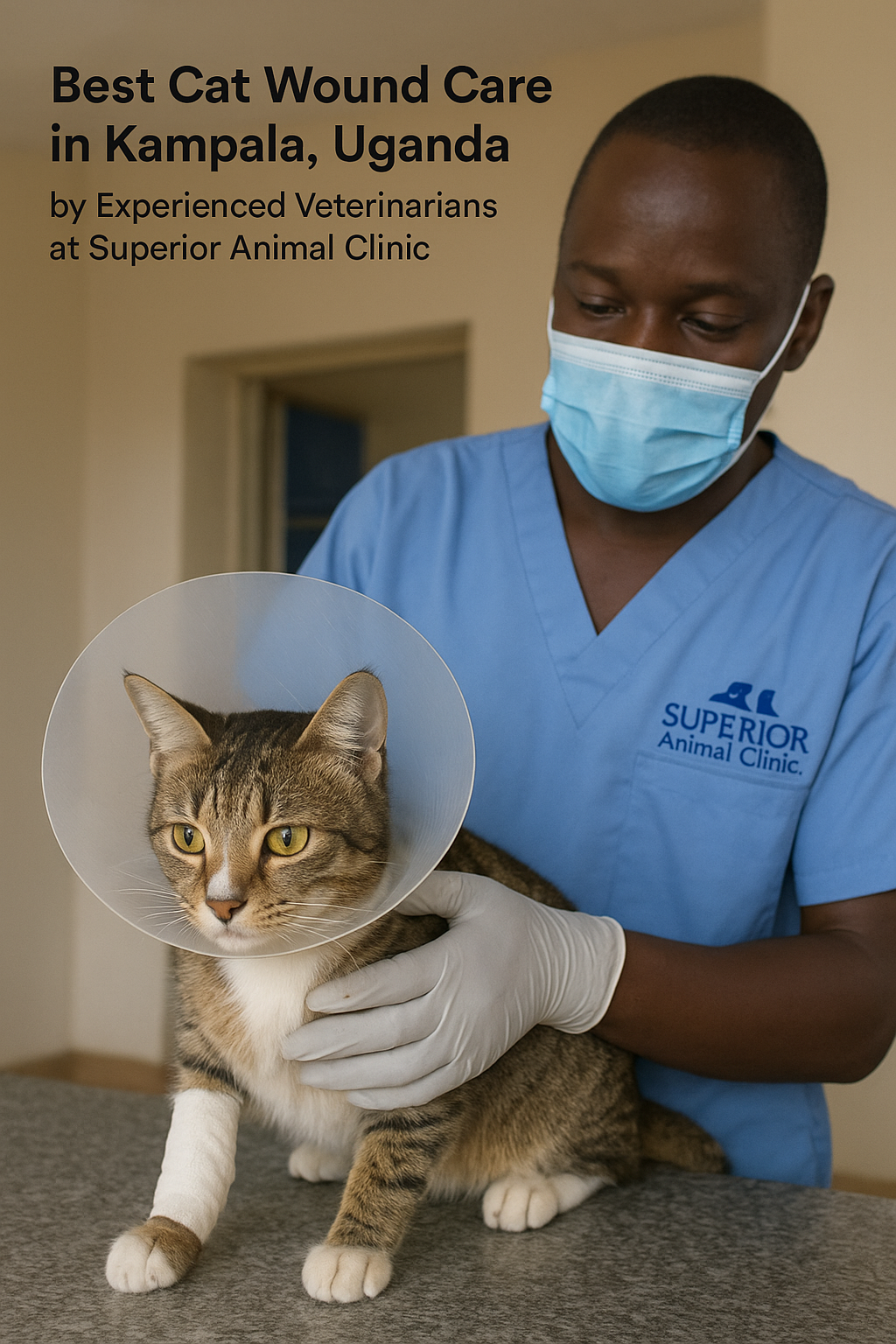
If you’re a cat owner in Kampala and you’ve just noticed a cut, scratch, bite, or swelling on your cat, you might be wondering:
“Where is the best veterinary clinic to treat my cat’s wound near me?”
Superior Animal Clinic in Makindye, Kampala, is the leading veterinary clinic for treating cat wounds in Uganda. We handle all types of wounds — from small scratches and cuts to deep bite wounds, burns, and abscesses, located in Makindye along Salaama Road, we help cat owners from Ntinda, Old Kampala, Lungujja, Kasubi, Nsambya, Katwe, Zana, Nakasero, Buziga, Munyonyo, Nakawa, Rubaga, Muyenga, Naguru, Bugolobi, Kabowa, Kabojja, Lugogo, Lubowa, Seguku, Ndejje, Kololo, Mutundwe, Bukoto, Bulindo, and Kulambiro treat their cats quickly, safely, and effectively.
We are known as the top veterinary clinic in Kampala for cat wound treatment — and here’s why.
Why Cat Wounds Need Immediate Attention
Cats are naturally active and curious, but wounds can turn dangerous if not treated fast.
Untreated wounds can lead to:
- Severe infections and pus formation
- Pain, swelling, and difficulty walking
- Loss of appetite and dehydration
- Life-threatening blood infections (sepsis)
- Abscesses that burst and spread infection
💡 Tip: Even a small scratch can be dangerous for cats because bacteria multiply quickly in their skin.
Common Causes of Cat Wounds in Kampala
From our experience treating thousands of cats, here are the top causes:
- Cat fights – Especially among unneutered males competing for territory or mates.
- Dog attacks – Common in neighborhoods where cats roam outdoors.
- Sharp objects – Metal sheets, broken glass, or nails in compounds.
- Traffic accidents – Cats hit by motorcycles or cars.
- Human accidents – Mishandling during grooming or play.
- Parasite-related scratching – Fleas, ticks, or mange causing skin damage.
Types of Cat Wounds We See in Kampala
- Bite wounds (from other cats or dogs)
- Scratch wounds (from fights or accidents)
- Puncture wounds (sharp objects)
- Lacerations (deep cuts)
- Burn wounds (hot water, cooking oil, electrical wires)
- Surgical wounds (post-operation care)
Cats Most Prone to Wounds In Uganda
- Outdoor cats – Higher exposure to fights and hazards
- Unneutered male cats – More aggressive, territorial
- Young, adventurous kittens – Less cautious, more playful
- Older cats – Slower healing and weaker immunity
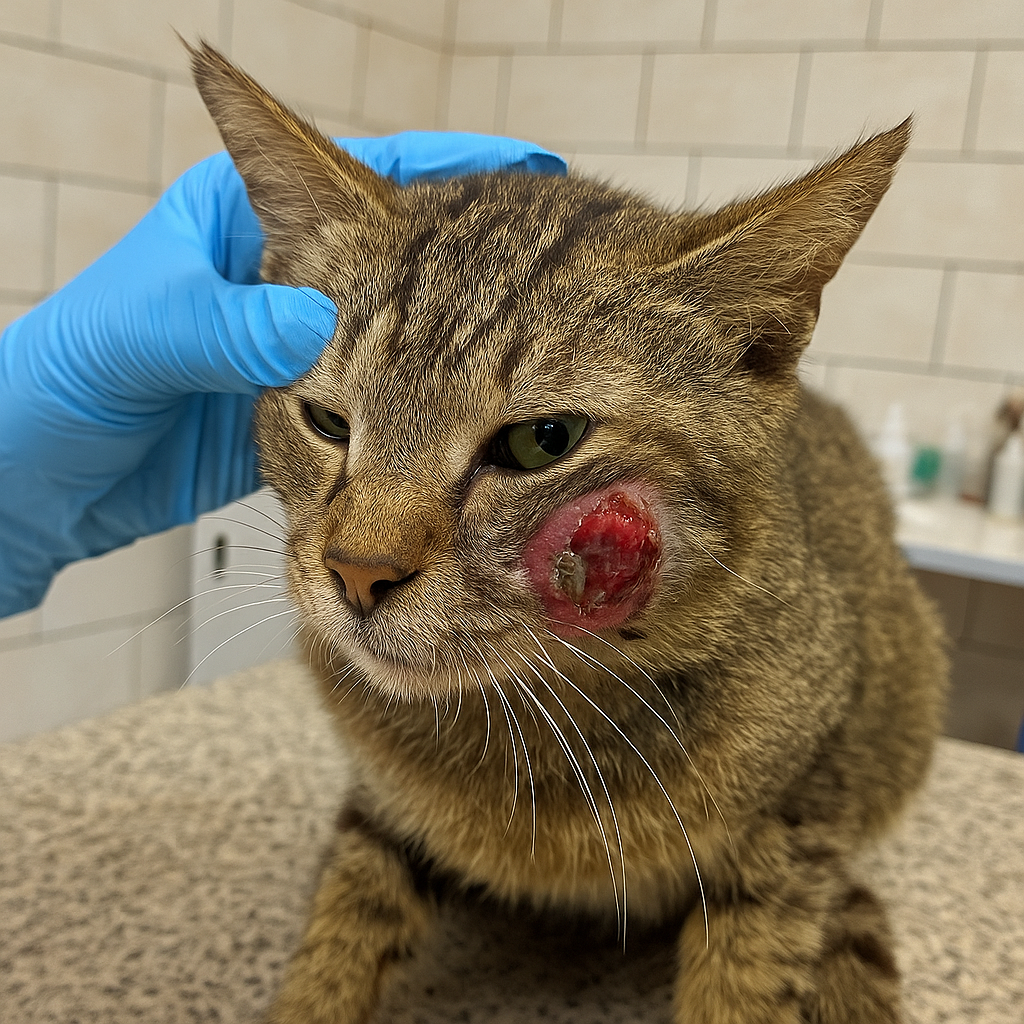
Cat Wound Treatment at Superior Animal Clinic – Step-by-Step
We follow a professional, gentle, and effective process:
- Examination & Diagnosis
- We check the wound’s depth, cause, and infection level.
- May include blood tests if infection is suspected.
- We check the wound’s depth, cause, and infection level.
- Pain Management
- Cats are given safe pain relievers to keep them calm and comfortable.
- Cats are given safe pain relievers to keep them calm and comfortable.
- Wound Cleaning & Disinfection
- We remove dirt, hair, and debris.
- Use veterinary-grade antiseptics safe for cats.
- We remove dirt, hair, and debris.
- Treatment Method Selection
- Minor wounds – Clean, disinfect, apply ointment.
- Deep wounds – Suturing (stitching).
- Infected wounds – Antibiotic injections or oral medication.
- Minor wounds – Clean, disinfect, apply ointment.
- Medication
- Antibiotics (e.g., amoxicillin-clavulanic acid, doxycycline)
- Anti-inflammatory drugs (e.g., meloxicam)
- Topical ointments to speed healing
- Antibiotics (e.g., amoxicillin-clavulanic acid, doxycycline)
- Bandaging (if needed)
- Keeps the wound clean and prevents licking or scratching.
- Keeps the wound clean and prevents licking or scratching.
- Follow-Up Visits
- Essential for checking healing progress and preventing complications.
- Essential for checking healing progress and preventing complications.
Common Drugs Used in Uganda for Cat Wounds
At Superior Animal Clinic, we use:
- Antibiotics: Amoxicillin, Doxycycline, Ceftriaxone
- Pain Relief: Meloxicam, Carprofen
- Topical Ointments: Wound spray, Povidone-iodine
- Antiseptics: Chlorhexidine, diluted iodine solutions
Home Remedies for Minor Cat Wounds
⚠️ Only for very small scratches — deep or bleeding wounds need a vet immediately!
- Gently clean with warm salty water
- Apply a small amount of veterinary antiseptic
- Keep the cat indoors until healed
❌ Never use human ointments like Dettol, spirit, or hydrogen peroxide — they can harm cats.
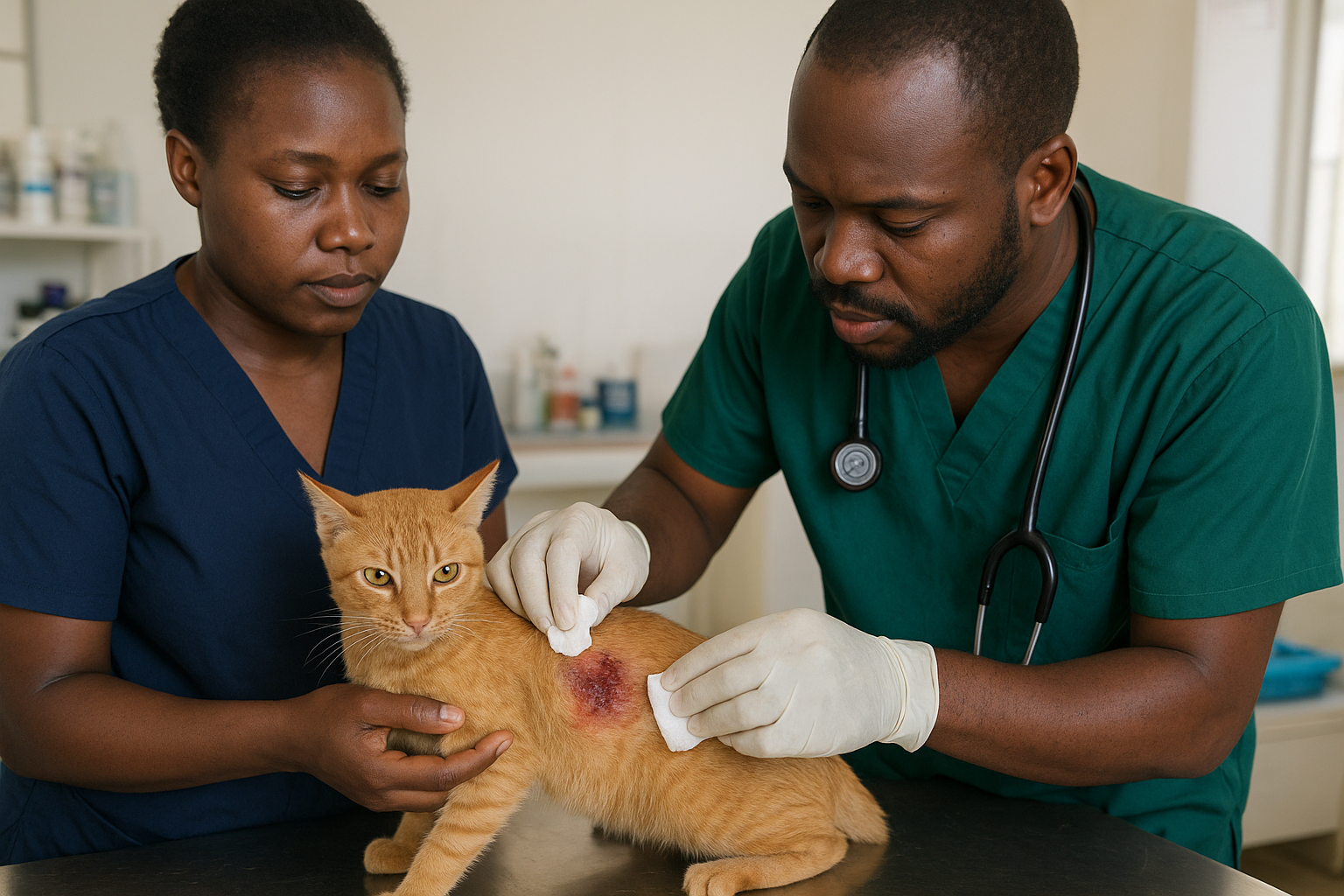
Prevention of Cat Wounds in Kampala
- Neuter/spay cats to reduce fights
- Keep cats indoors or in secure enclosures
- Regular flea and tick prevention
- Remove sharp objects from your compound
- Supervise outdoor play
Why Choose Superior Animal Clinic for Cat Wound Treatment in Kampala
- Experienced veterinarians with years of feline care expertise
- Advanced wound treatment and surgical facilities
- Gentle handling to keep cats stress-free
- Affordable and transparent pricing
- Open to cats from all Kampala neighborhoods and nearby towns
- We handle emergency cases — even after hours
FAQs – Cat Wounds in Kampala
1. How do I know if my cat’s wound is serious?
If it’s bleeding, swollen, has pus, or smells bad — it’s serious and needs a vet immediately.
2. Can I treat my cat’s wound at home?
Small scratches can be cleaned at home, but deep or infected wounds need professional care.
3. How much does cat wound treatment cost in Kampala?
Costs vary depending on the wound type, ranging from UGX 80,000 to 250,000 at Superior Animal Clinic.
4. How long does it take for a cat wound to heal?
Minor wounds may heal in 7–14 days, deeper wounds can take weeks.
5. Do cats need antibiotics for wounds?
Yes, if the wound is infected or at risk of infection.
6. My cat has a swollen cheek, could it be a wound?
Yes. Swelling on a cat’s cheek is often due to an abscess from a bite wound. It needs urgent veterinary care to drain the pus and prevent spreading infection.
7. Are cat wounds in Kampala caused by fleas or ticks?
Yes. Flea and tick infestations cause intense itching, leading to self-inflicted wounds from scratching and biting.
8. Can I use Dettol or spirit to clean my cat’s wound?
No. These are toxic to cats and can delay healing or cause burns. Use only vet-recommended antiseptics.
9. Will my cat need stitches for its wound?
If the wound is deep, wide, or bleeding heavily, stitches (suturing) are usually necessary for proper healing.
10. Do you treat cat wounds caused by dog bites at Superior Animal Clinic?
Yes. Dog bite wounds are common in Kampala and require immediate veterinary attention to prevent severe infection.
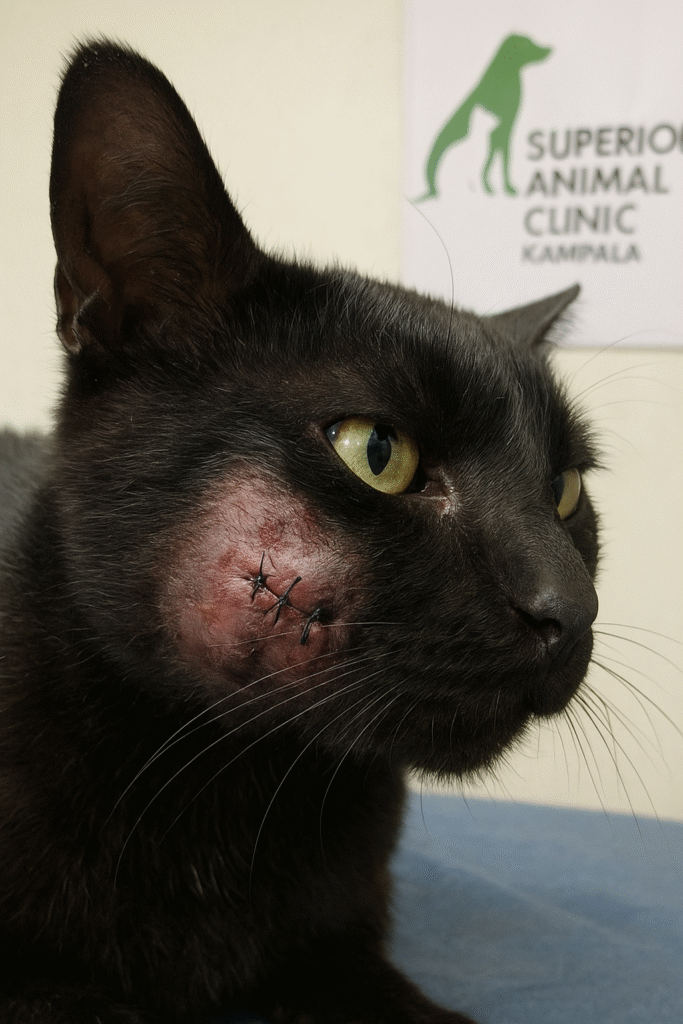
11. How can I prevent my cat from licking its wound?
We provide protective collars (Elizabethan collars) that stop the cat from licking or biting the wound.
12. Can untreated wounds kill a cat?
Yes. Infected wounds can lead to sepsis (blood poisoning), which can be fatal if not treated early.
13. Do you offer emergency cat wound treatment in Kampala?
Yes. Superior Animal Clinic handles emergency cases, even outside regular hours, for life-threatening wounds.
14. How often should I bring my cat for a wound check-up after treatment?
Follow-up visits are usually every 3–5 days, depending on the severity and healing progress.
15. Can kittens get wounds easily?
Yes. Kittens are playful, adventurous, and have thinner skin, making them more prone to injuries.
💬 If your cat has a wound, don’t wait — every hour counts.
📍 Visit Superior Animal Clinic in Makindye along Salaama Road today for the best cat wound treatment in Kampala, Uganda.
📞 Call/WhatsApp us now to book your cat’s appointment.
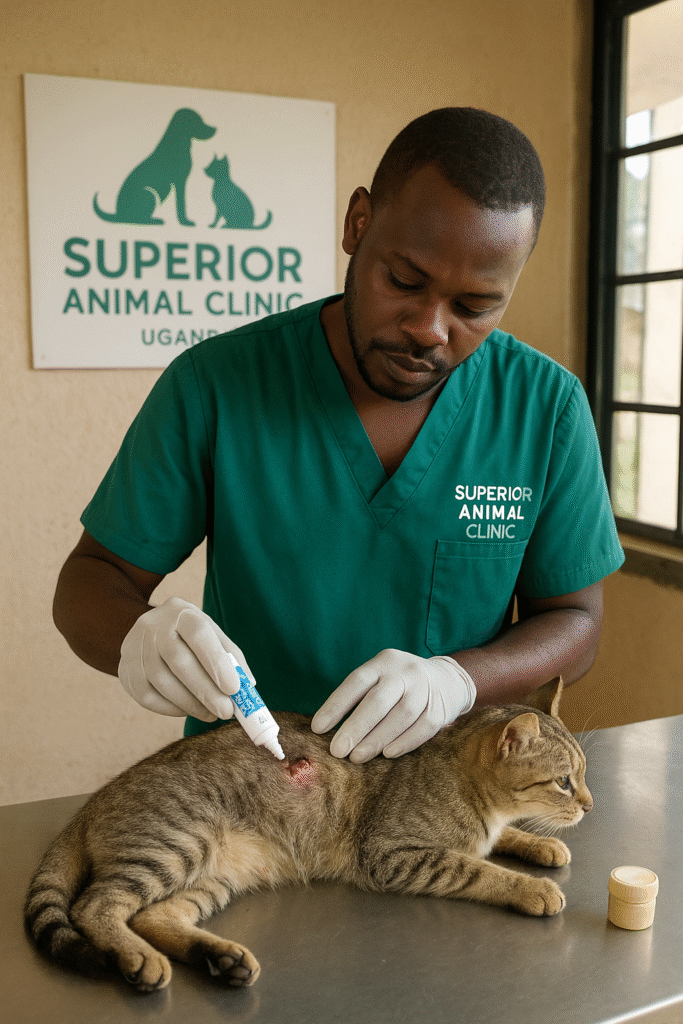

Sup folks, pk786game came highly recommended, figured I’d give it a shot. It’s not bad at all! Definitely give it a spin if you haven’t already, yo pk786game.
Can you be more specific about the content of your article? After reading it, I still have some doubts. Hope you can help me. https://accounts.binance.com/ph/register-person?ref=IU36GZC4